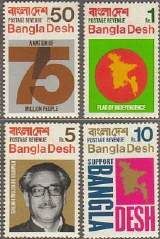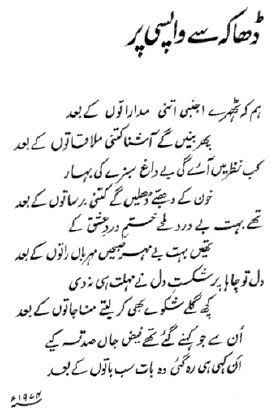Adil Najam
 As the fourth part of our series on the events of 1971, we are reposting this post which was first published at ATP on December 16, 2006. We are reposting it with all the original comments since they, as a whole, are very much part of the conversation we all need to have with ourselves. The previous three parts of the series can be read here, here and here.
As the fourth part of our series on the events of 1971, we are reposting this post which was first published at ATP on December 16, 2006. We are reposting it with all the original comments since they, as a whole, are very much part of the conversation we all need to have with ourselves. The previous three parts of the series can be read here, here and here.
Today is December 16.
Today Bangladesh will mark its 35th ‘Victory Day.’
 Most Pakistanis will go about their lives, not remembering or not wanting to remember. We should remember – and learn – from the significance of this date.
Most Pakistanis will go about their lives, not remembering or not wanting to remember. We should remember – and learn – from the significance of this date.
Not because it marks a ‘defeat’ but because it marks the end of a dream, 24 years of mistakes, horrible bloodshed, traumatic agony, and shameful atrocities. The constructed mythologies of what happened, why, and who is to be blamed need to be questioned. Tough questions have to be asked. And unpleasant answers have to be braced for. We need to honestly confront our own history, for our own sake.
But right now, the goal of this post is different. We at ATP just wish to extend a hand of friendship to our Bangladeshi friends. May the memories we make in our future be very different (and more pleasant) than the scars we carry from our past.
There is much – too much – that I wish to say; but cannot find words for. So let me do what I always do when I am at a loss of words. Let me quote Faiz Ahmad Faiz, who in his memorable 1974 poem ‘Dhaka say wapsi par’ (On Return from Dhaka) expressed what I wish to say so much better than I ever could.
We share with you here the original poem in Urdu, a version in ‘Roman Urdu,’ a wonderful English translation of the poem by the late Agha Shahid Ali in his book The Rebel’s Silhouette, and a video of Nayarra Noor singing the verses with the passion and feeling that they deserve.
ham ke Thehre ajnabi itni mulaaqaatoN ke baad
phir baneiN ge aashna kitni madaaraatoN ke baadkab nazar meiN aaye gi be daaGh sabze ki bahaar
khoon ke dhabe dhuleiN ge kitni barsaatoN ke baadthe bahut bedard lamhe khat’m-e-dard-e-ishq ke
theiN bahut bemeh’r subheiN meh’rbaaN raatoN ke baaddil to chaaha par shikast-e-dil ne moh’lat hi na di
kuchh gile shikwe bhi kar lete manaajaatoN ke baadun se jo kehne gaye the “Faiz” jaaN sadqe kiye
an kahi hi reh gayi woh baat sab baatoN ke baad
Agha Shahid Ali’s Translation:
After those many encounters, that easy intimacy,
. we are strangers now —
After how many meetings will we be that close again?When will we again see a spring of unstained green?
After how many monsoons will the blood be washed
. from the branches?So relentless was the end of love, so heartless —
After the nights of tenderness, the dawns were pitiless,
. so pitiless.And so crushed was the heart that though it wished
. it found no chance —
after the entreaties, after the despair — for us to
. quarrel once again as old friends.Faiz, what you’d gone to say, ready to offer everything,
. even your life —
those healing words remained unspoken after all else had
. been said.



















































@Natasha “I wish the officers responsible for raping women and killing innocent civillian could be brought to justice.That couldve helped in curing the wounds of our Bengali brethren.”
Those officers who have by now 1. retired or 2. are now Top military brass.
A wound/lojja/sharam/ never heals. Any woman whose gone through that trauma will attest to it.
//[Sorry to rant. I know some of you’ll are sincere and had no part in it.. But why now ? why not in the 80’s 90’s ??]
//
–
Why now?Because most of us who talk about it were not even born or too young to understand the atrocities fellow Pakistanis went through in the 60s and 70s.
It was an unnatural union that came to a bloody end thanks to the racist politicians and corrupt army officers from the west , traitors from the east and our dear neighbour.
I wish the officers responsible for raping women and killing innocent civillian could be brought to justice.That couldve helped in curing the wounds of our Bengali brethren.
Through the past couple of decades, the bangal community has been hardworking, saving, and struggling to make a better life which ever country we go. For some of us, a drunken FOB, Pakistani who loudly makes unreasonable demands in our restaurant(s) brings back memories of the past.
Some wound never heal, some scars never go away. Tell a boy why kakima never returned from college. Or kakudada why didi no longer comes out of the house ?
Sharam karo. The Biharis tsk tsk, crocodile tears being now shed by the liberal intellectuals in Pakistan is ironic.
The fascination with kashmiri or Afghani or iraqi brethen is simple – They are like you.. fairer. Biharis,bengalis were different.
300,000-400,000 didi/kaki/bon/pechi/ma/ kidnapped and raped/killed/savaged. No one talks about why ? how ?
We could not have been the muslim brethen because you dont commit such atrocities.
Hain, raag ache, ke korbo…kakima phirodbe na [yes, There is anger, what to do… the aunt is not gonna return]
Where was Faiz when the poets,writers,intellectuals were being killed ? Certainly he would have known ?
[Sorry to rant. I know some of you’ll are sincere and had no part in it.. But why now ? why not in the 80’s 90’s ??]
With apologies…
Strangers, we turned out to be, when all the treating was done
Chance meetings will make us acquaintances? perhaps; in years to come
Will we possibly ever see, unspoiled beauty reign again
How much rain, will it take, to wash away that bloody stain
So horrible was the end, a lost love, so it seems
We woke up to a nightmare, after all the pleasant dreams
Would’ve loved an exchange, but the broken-heart didn’t have the strength
Of a few pointed questions, a few comments, short and sweet, nothing at length
What you really wanted to say, Faiz, for which you went all the way
After all that was said and done, that one thing, you just couldn’t say